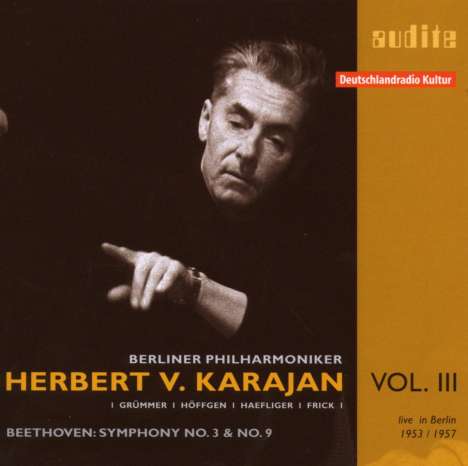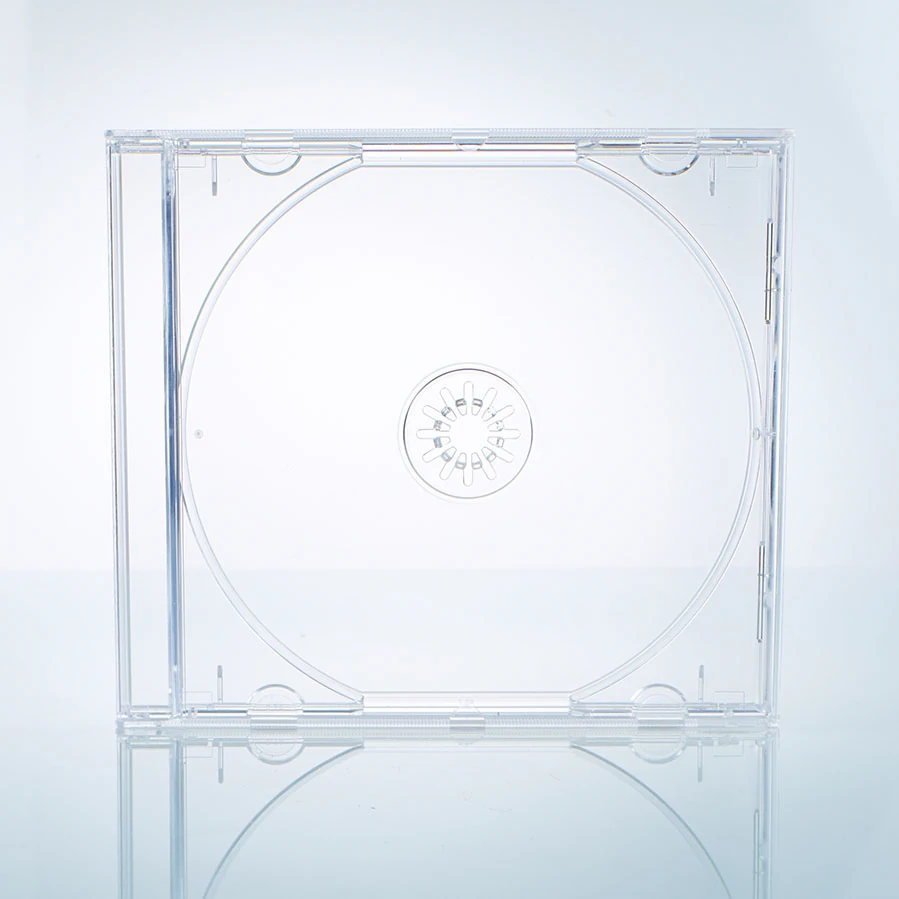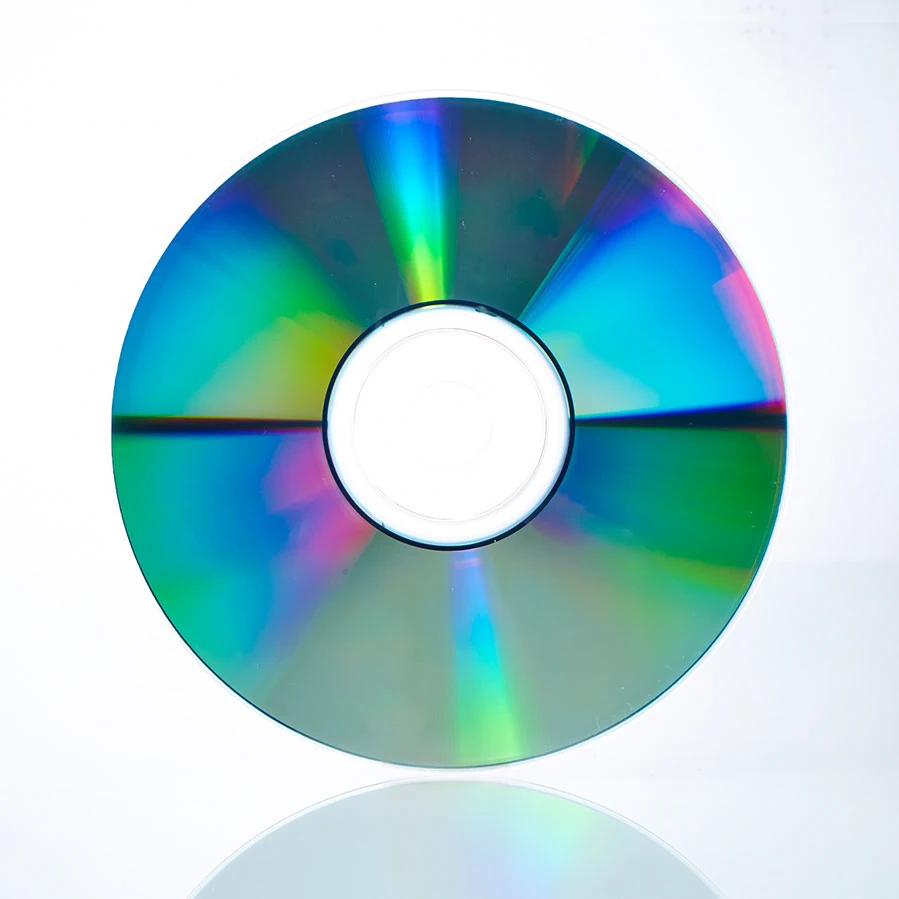Herbert von Karajan - Audite-Edition Vol.3 auf 2 CDs
Herbert von Karajan - Audite-Edition Vol.3
Herkömmliche CD, die mit allen CD-Playern und Computerlaufwerken, aber auch mit den meisten SACD- oder Multiplayern abspielbar ist.
(soweit verfügbar beim Lieferanten)
Beethoven: Symphonien Nr. 3 & 9
- Künstler:
- Elisabeth Grümmer, Marga Höffgen, Ernst Haefliger, Gottlob Frick, Berliner Philharmoniker, Herbert von Karajan
- Label:
- Audite
- Aufnahmejahr ca.:
- 1955/57
- Artikelnummer:
- 8584613
- UPC/EAN:
- 4022143234148
- Erscheinungstermin:
- 10.10.2008
Diese Aufnahmen zweier Beethoven-Sinfonien stammen aus der Umbruchzeit der Berliner Philharmoniker. Furtwängler war offiziell wieder Chefdirigent, aber aus gesundheitlichen und persönlichen Gründen nicht in der Lage, das Orchester kontinuierlich zu betreuen. Seit seiner ersten Begegnung mit den Berliner Philharmonikern wünschte sich Herbert von Karajan nichts mehr, als deren Chefdirigent zu werden. Die Aufnahmen belegen seine frühe Arbeit mit dem Orchester als Gast wie auch als Nachfolger Wilhelm Furtwänglers. Karajans erstes Konzert mit dem Orchester nach dem Krieg mit Beethovens "Eroica" am 8. September 1953 zeigt den Zustand des Orchesters, aber auch, was er als Dirigent in dieser Lage zu leisten vermochte. Karajan war vorher vor allem mit dem London Philharmonia beschäftigt und von dessen Virtuosität begeistert. Bei den Berliner Philharmonikern jedoch fand er Dimensionen, die über Virtuosität hinausgingen, einen Ausdruck, der in Aufführungen über das Geprobte hinauswuchs. Zur Zeit des Mitschnitts der Neunten (25. April 1957, aufgezeichnet im Konzertsaal der Hochschule für Musik aus Anlass des 75. Geburtstag des Orchesters) war Karajan bereits Chefdirigent der Berliner Philharmoniker. Das Orchester befand sich noch in der Umbauphase, in der Karajan die klangliche Ausrichtung des Orchesters seiner musikalischen Auffassung anzupassen suchte. Beethovens Neunte, mit einem Solistenquartett von seltener Güte, zeigt Karajan mit weiten formalen Atem und dicht gebundenem Klang bereits auf dem Weg zur ersten Gesamtaufnahme der Sinfonien. Zu dieser Produktionen gibt es auf unserer Homepage einen "Producer's Comment" vom Produzenten Ludger Böckenhoff.
These recordings of two Beethoven symphonies date from a period of change in the history of the Berlin Philharmonic. Furtwängler was again its official principal conductor, but his declining health and other personal reasons left him unable to supervise the orchestra on a continuous basis. Ever since his first encounter with the Berlin Philharmonic Herbert von Karajan wanted nothing more than to be its principal conductor. These recordings shed light on his early work with the orchestra as a visiting conductor and as the successor to Wilhelm Furtwängler. Karajan's first post-war concert with the orchestra, featuring Beethoven's Eroica, on 8 September 1953 reveals not only the actual condition of the orchestra but also what Karajan was able to accomplish as a conductor in this situation. At the time Karajan was mainly busy with the London Philharmonia Orchestra and raved about its virtuosity. Yet, in the Berlin Philharmonic, he discovered dimensions that transcended virtuosity, powers of expression that went beyond rehearsal levels in the moment of performance. At the time of the live-recording of Beethoven's Ninth, performed in the auditorium of the Berlin Musikhochschule on 25 April 1957 to celebrate the orchestra's seventy-fifth anniversary, Karajan was already the orchestra's principal conductor. The orchestra was in a phase of tedious remodeling caused by Karajan's attempts to shape the sound of the orchestra according to his musical philosophy. Beethoven's Ninth, with a sterling quartet of vocal soloists, has a large-scale command of form and a dense, coherent sound that reveal Karajan well on his way to the first complete recording of the symphonies. There is a "Producer's Comment" from producer Ludger Böckenhoff about this production available.
Rezensionen
Karajan als Zeitgenosse, nicht Übermaestro. (Die Welt)
Disk 1 von 2 (CD)
-
1 Applaus
Sinfonie Nr. 3 Es-Dur op. 55 "Eroica"
-
2 1. Allegro con brio
-
3 2. Marcia funebre: Adagio assai
-
4 3. Scherzo: Allegro vivace
-
5 4. Finale: Allegro molto - Poco andante - Presto
-
6 Applaus
Disk 2 von 2 (CD)
-
1 Applaus
Sinfonie Nr. 9 d-moll op. 125
-
2 1. Allegro ma non troppo, ma poco maestoso
-
3 2. Molto vivace
-
4 3. Adagio molto e cantabile - Andante moderato - Adagio
-
5 4. Presto - Allegro assai - Presto: O Freunde, nicht diese Töne! - Allegro assai
-
6 Applaus
Mehr von Ludwig van Beet...
-
Carl Heinrich ReineckeSämtliche Klaviertrios2 CDsAktueller Preis: EUR 14,99
-
Schuppanzigh Quartett - Beethoven / Ries / RodeCDAktueller Preis: EUR 14,99
-
Musik für Cello & Harfe - "Cello meets Harp"CDVorheriger Preis EUR 12,99, reduziert um 0%Aktueller Preis: EUR 7,99
-
Ludwig van BeethovenMödlinger Tänze WoO 17 Nr.1-11CDAktueller Preis: EUR 7,99








